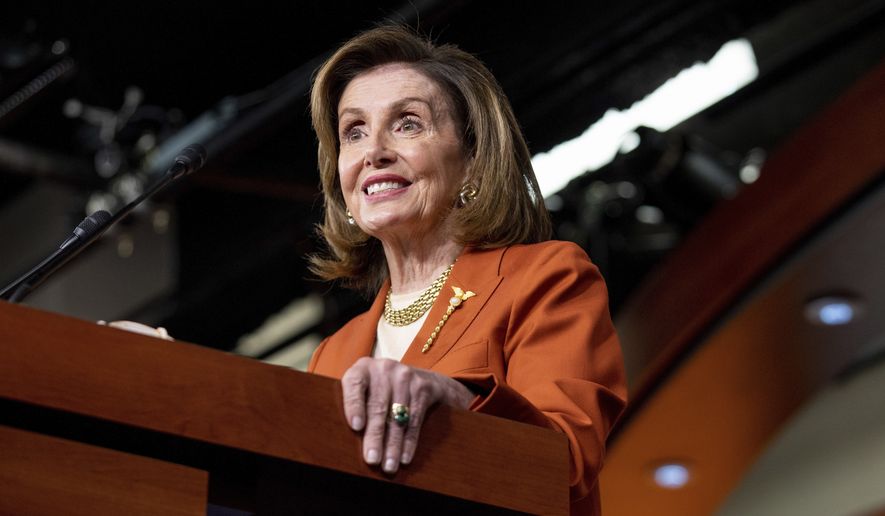House Democrats passed two partisan voting measures in party-line votes on Thursday, setting up a debate in the Senate over rewriting the nation’s electoral laws and blowing up the filibuster.
In a 220-203 vote, the House passed the Freedom to Vote Act and the John Lewis Voting Rights Act. The bills are part of a sweeping effort by President Biden to abrogate a slew of election laws in GOP-led states since 2020.
“Today is a big day for our democracy,” said House Speaker Nancy Pelosi, California Democrat. “Passing these bills will be very important for voting rights and our country, so fundamental to our democracy.”
The Freedom to Vote Act requires states to offer same-day voter registration, makes Election Day a national holiday, and mandates 15 days of early voting. It also requires universal vote-by-mail, creates a taxpayer-backed public-financing system for House elections and imposes new restrictions on the ability of states to draw their electoral districts.
The John Lewis Voting Act would grant the Justice Department sweeping new powers to oversee state elections. In some cases, according to the bill, states would even have to secure the DOJ’s approval before implementing new voting laws.
“As the Senate has done many times in its history, it must soon act again to safeguard democracy from the dangers of the present day, the power of dark money, voter suppression, and efforts to subvert the democratic process from the bottom up,” said Senate Majority Leader Charles E. Schumer, New York Democrat.
Republicans defend the new laws in GOP-run states as measures that secure elections including voter ID laws and restrictions on mail-in ballots. They say the Democrats’ bill would nationalize elections and is designed to give Democrats an edge at the ballot box.
The two bills now head to the Senate where Democrats are eager to kickstart a debate not only on voting but also the chamber’s long-standing filibuster rules. The filibuster, which requires 60 votes for most legislation to survive, has repeatedly been used by Republicans to block the Democratic election bills in the evenly-split chamber.
Since the bills passed the House using an emergency procedure, they can be immediately considered by the Senate. Lawmakers say that will allow the chamber to bring the bill up for debate without requiring the 60-vote filibuster threshold to be met. The filibuster threshold will be in place, however, for ending debate on the bill and moving forward toward a vote.
Mr. Schumer hopes the attention brought by the debate will either convince Republican lawmakers to cave or cement unity in their ranks behind blowing up the filibuster.
“The Senate will finally hold a debate on the voting rights legislation for the first time in this congress, and every senator will be faced with the choice of whether or not to pass this legislation to protect our democracy,” said Mr. Schumer.
Democrats say that if the measures cannot pass the evenly split Senate because of a GOP filibuster, then the rule should be scrapped altogether. To succeed, Mr. Schumer needs the support of all 50 Senate Democrats.
Standing in the way, though, are a cadre of moderate Democrats, most notably Sen. Kyrsten Sinema of Arizona and Sen. Joe Manchin III of West Virginia.
Republicans say that weakening of the filibuster will permanently damage the Senate and the constitutional framework of checks and balances.
“If we change the 60-vote threshold,” said Sen. John Kennedy, Louisiana Republican. “We change this institution, which is part of the institution of the United States Senate, it will gut this body like a fish.”
• Haris Alic can be reached at halic@washingtontimes.com.




Please read our comment policy before commenting.